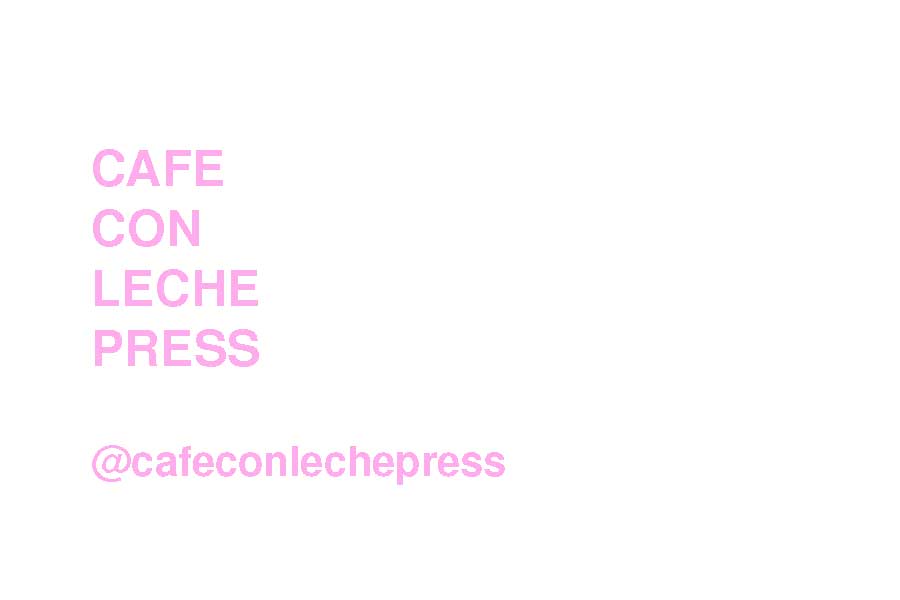Founded by co-editors Diente and Boxo, self-described as a “pequeno literary-art mag,” Cafe Con Leche is a press that features queer writers and trans voices of colors.
On Monday, Aug. 19, at William Way LGBT Community Center, the press will host a poetry reading, QPOC open mic and release three zines with new work by QPOC artists.
The zines included ALLEGORIES DEL FUTURO, a zine of poetry with work by jamal rashad, Carson Lee, BOXO, Fiorella Flowers and a.am.ekh; “TAN GRAFIC,” a visual experience with work by Dani deLeon, AG Carrol and Pretty Boy Crybaby; and “MANIFESTO,” featuring the work of Agua Diente and Dia Knight. Billed as Cuirtopian Fantaci, the event promises to be a unique exploration giving voice to the often marginalized members of the LGBT community.
Offering impactful work, Diente and Boxo’s methods are steeped in the rebellious traditions of Sylvia Rivera and Essex Hemphill. Counter-cultural and anti-literature, by and for a post-millennial wave of artists and writers, Cafe Con Leche explodes from a perceived underground, bringing marginalized voices forward.
PGN spoke with the curators and publishers of Cafe Con Leche ahead of Cuirtopian Fantaci about the need for community, POC art, and empowered voices in uncertain times.
PGN: An essential part of your current work is the zine “ALLEGORIES DEL FUTURO” which centers QPOC and features them as writers. What was the impetus and inspiration for this direction of the zine? Is there a void that needs to be filled?
D: We wanted our zines, from the start, to have visual and ‘literary’ work that is Queer created and Black and Brown centered. Boxo and I are artists and over the years have found that no space is going to heal like the space we make. This specific run of work is inspired by the future — our future. But time is a construct, right? And in my opinion, our feelings and experiences are what generationally shape our community and culture. The pieces featured in “ALLEGORIES DEL FUTURO” aren’t literally from the future, but the emotions invoked by the work are; those feelings are timeless. From the past, present and future. They’ll forever be shared in this community, whether as a lesson, memory or belief. I don’t believe in literature; it’s an elitist, ableist and racist social and academic concept. I believe in crafters: people who need to write, paint, dance etc., because that’s what soothes their heart and soul. From what I see, most opportunities for Black and Brown writers are created by other Black and Brown writers, so I believe the void is a lack of platform not catered to a white audience.
B: I believe that the literary scene and mags will talk a lot about uplifting marginalized folx, but largely publish their work without compensation, tokenizing to seem diverse and generally avoid Black- and Brown-centered reading series. Institutionally-funded presses need to give more space and free things to POC.
PGN: How important is it that you hold the event at William Way and how does this impact QPOC representation in Philadelphia?
D: Full transparency, we sought out William Way because they’re a well-known and respected center. In return they’re asking for 20 percent of door sales from this event. The reading being at William Way is important because it would make us, artists from a largely ignored subset of our shared community, visible and hopefully palatable to the white side of said community. Many talented QPOC artists and writers, including me and Boxo, lack the energy, time and space to expand on our work because of resource instability. Having the opportunity to present ourselves and our work outside of tokenization means having a chance to receive sponsorship and support from people who actually have the resources to extend. Gayborhood culture largely centers white gays, freely gives them a platform and accreditation in their work. Cafe Con Leche is hoping to maneuver our way into these circles simply out of nerve.
PGN: Can you talk about your connection with quickly-rising poet jamal rashad?
B: Jamal and I met online when I was more actively posting book reviews on Instagram. We shared enthusiasm over queer fiction and poetry, subversive writing that isn’t so flowery. Honestly I see them as a mentor. We read and critique each other’s work, and a large portion of the reading I’ve done in 2019 was recommendations from them. They included me in “Imagoes: A Queer Anthology” (Love, Pain and Poetry, 2019) and brought me to Washington, D.C., to do a reading for the book!
PGN: How does rashad’s work fit into Cafe Con Leche’s aesthetic?
B: Their work fits in Cafe Con Leche as a queer from a slightly different era reflecting on the ways they’ve had to make it to still exist as a Black queer in 2019. These words are just as important as all the fresh young nonbinary folk we’re publishing!
PGN: The three zines featured in this show are vast in scope, what theme ties them together?
D: Our experiences and trajectory as queer folk. Everyone involved is very different from one another, but we all share an identity with love — who we are in relation to love. For me, Cuirness [Cafe Con Leche’s unique vision of “queerness”] is more than just physical or sexual identification. It’s how I celebrate the love I experience in my lifetime. I said before that feelings and experiences are what shape us, and I meet people that echo these feelings. It’s like we signal for each other through our art, writing, performance etc. and whenever we all come together, we get to see the future — sad, happy or whatever. Stories, art and spirituality, things traditionally passed through generations, this zine triad is a snapshot of what our community will feel after us too.
Cuirtopian Fantaci takes place Aug. 19 7 p.m. at William Way LGBT Community Center, 1315 Spruce St.
